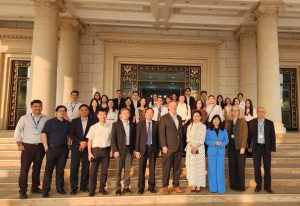A New Prospective View of Accreditation of Medical Programs in Vietnam
Medical education in Vietnam is undergoing an exciting period of growth and change. With an increasing demand for medical practitioners to meet the workforce needs of the country, student enrolment numbers continue to climb. To ensure quality of medical graduates – as well as medical education quality improvement – recognition both nationally and internationally, through medical program certification is crucial. Accreditation mechanisms, therefore, need to be in place through relevant regulatory bodies.
In a recent study, Dr. Ha Minh Thuy and Prof. Zarrin Siddiqui from the College of Health Sciences, VinUniversity, have identified challenges and needs regarding the accreditation of medical program in Vietnam. In their article, Accreditation of medical education in Vietnam: From local to global excellence, published in Pakistan Journal of Medical Sciences in March 2022, they have proposed recommendations enabling local medical accreditation to be more independent, effective and globally recognized.
A major challenge in Vietnam involves national standards for accreditation set by the Ministry of Education and Training (MOET). A critical discrepancy arises as the standards defined by MOET are not relevant for professional medical degree programs. As a result, no medical program has been accredited under these national standards. Meeting standards set nationally, which are recognized by the international medical community, directly impacts the future of Vietnam trained medical practitioners who may want to extend their profession overseas. The researchers noted that, as of 2024, the Education Commission for Foreign Medical Graduates (ECFMG) in USA will only accept applicants from a medical school accredited by an agency recognized by the World Federation of Medical Education (WFME), an independent public organization established in 1972 by the World Health Organization and the World Medical Association. Dr. Thuy and Prof. Siddiqui, therefore, outlined directives to take medical program accreditation forward.
Identifying standards based on those of internationally recognised governing bodies, such as WFME – and equivalent, from USA, Canada, Australia, United Kingdom – should be the first important step in medical accreditation reform in Vietnam. Secondly, the researchers advised the involvement of all stakeholders to assess how to contextualize WFME standards within Vietnamese settings. Thirdly, establishing an independent national agency with a sole responsibility for medical education accreditation. Given the scarcity of professionals with expertise and experience in medical education, the fourth recommendation is to nurture human capacity development to produce experts in the field. Finally, there is a demand in Vietnam for medical institutions to form collaborative networks for mutual assistance, learning, and innovation on accreditation concerns.
Curriculum Development Manager, MD Program
College of Health Sciences College of Health Sciences
PhD Program Director, MD Program, College of Health Sciences College of Health Sciences
‘This paper expresses our concerns and ambitions about the accreditation for medical programs in Vietnam,’ say Dr. Ha Minh Thuy and Prof. Zarrin Siddiqui. ‘We do hope to receive the attention of policymakers and other stakeholders. We believe that there will be more progress in medical education accreditation, to support teaching and learning excellence at national and international level.’
You can read the whole story at this LINK.
By Nguyen Minh Phuong & Fi Webster.
Reference
Ha, T. M., & Siddiqui, Z. S. (2022). Accreditation of medical education in Vietnam: From local to global excellence. Pakistan Journal of Medical Sciences, 38(4). https://doi.org/10.12669/pjms.38.4.5077





![[Job Opening]: Teaching Assistant for Research Minicourse Development at VinUniversity](https://vinuni.edu.vn/research/wp-content/uploads/2024/07/hiring-7062502_1280-300x143.jpg)